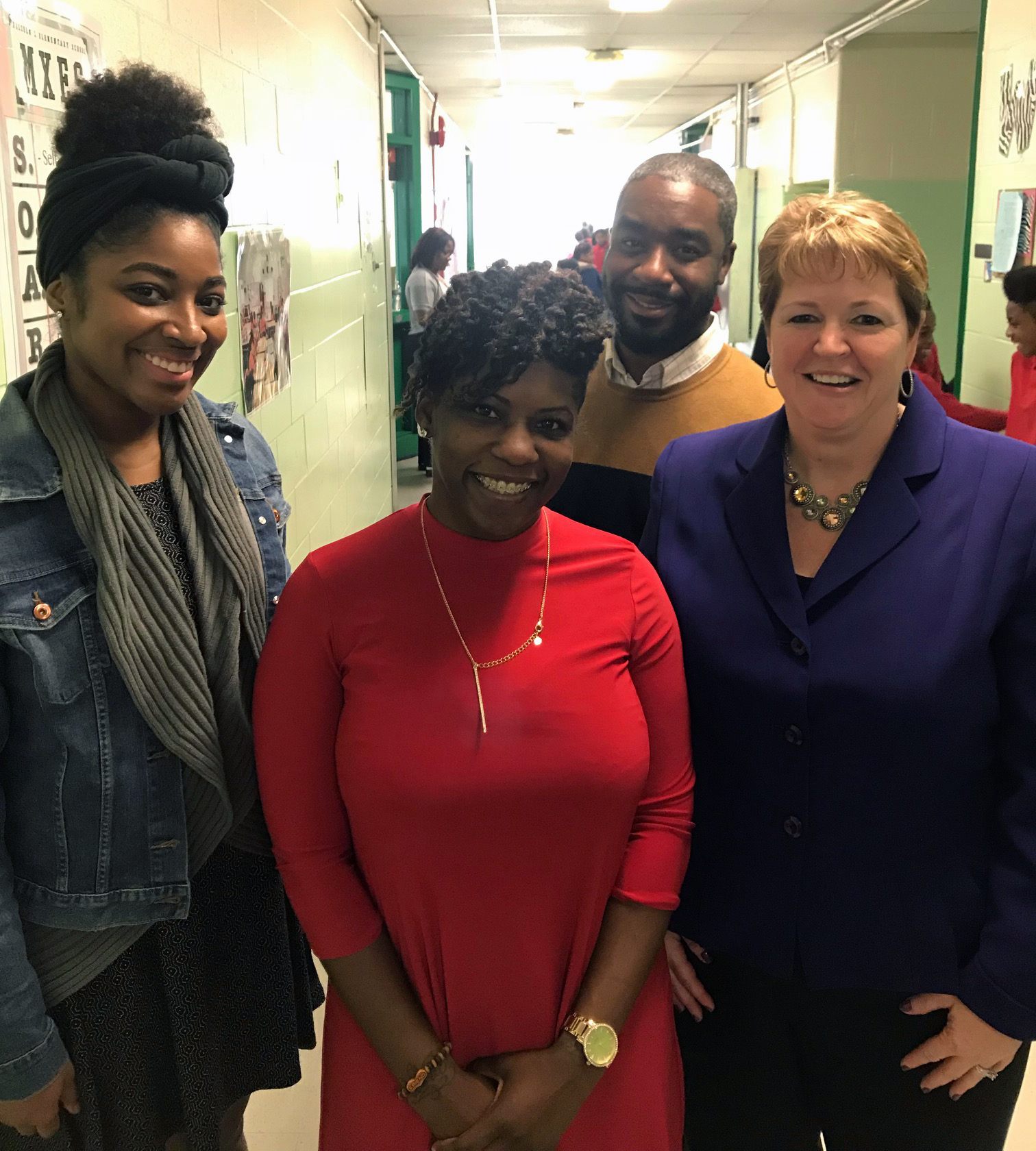October Person of the Month: Clarice Crawford

Pictured left to right: Joscelyn Reed, instructional coach; Clarice Crawford, fifth-grade teacher; Matthew Vialva, social work consultant; and Dawn Foreman, program director.
Ms. Crawford is a fifth-grade teacher at Malcolm X Elementary School in Washington, D.C. She was nominated by Program Director Dawn Foreman who described Ms. Crawford’s classroom as a “well-oiled machine” with “strong and effective systems in place.” Dawn noted that, “Ms. Crawford frequently and consistently uses proactive language that fosters students’ belief in themselves. She believes in the ability of her students, and she lets them know it each and every time she stands before them. Ms. Crawford is making a difference in the life of each child in her class.”
THE 180: How long have you been a teacher?
CLARICE CRAWFORD: This is my eleventh year; my sixth year here at Malcolm X. I went to Virginia State University and taught in Virginia for several years, but I’m a native Washingtonian. After I got my feet grounded in teaching in Virginia, I decided to move back so I could give back to my D.C. community.
THE 180: Did you always know that you wanted to be in education?
CLARICE CRAWFORD: Yes. I remember being in the third grade and being so mesmerized by my teacher. She always made it seem like teaching was fun. So I thought, “When I get older, I want to be like Miss Wilson. I want to be a teacher.”
THE 180: And is teaching still fun?
CLARICE CRAWFORD: Yes. [LAUGHTER]
THE 180: This is Malcolm X’s second year partnering with Turnaround for Children. What changes have you noticed at the school?
CLARICE CRAWFORD: I’ve seen an improvement not only in how we address the academics – the successes and the deficits – but more so, the social and emotional needs of our kids; being able to understand the weight of what we’re dealing with when it comes to teaching our children. Learning about how trauma affects their brains and learning – it’s made us want to be more conscientious of how we’re teaching our children.
THE 180: Program Director Dawn Foreman said that you really promote growth mindset in your classroom. Is growth mindset something you discuss explicitly with your students or is it implied through your feedback to them?
CLARICE CRAWFORD: I’ll be perfectly honest with you. When [Instructional Coach] Barry Brinkley presented growth mindset during our Turnaround for Children meeting last year, I went back to my classroom 10 minutes later and asked, “How many of you guys think that you can get smarter?” And it amazed me how many of my students didn’t think they could get smarter. From that moment on, I knew that I wanted to help my children understand that they can get smarter through practice and rigorous work.
I became more conscientious about how I show my students their academic progress and growth. My students are really able to articulate their growth in reading. They talk about their data points – how they’re doing, where they want to be and their plan to get there. I think that growth mindset itself has even changed what they think it means to be a student.
THE 180: What do you think is the most important thing students need to succeed?
CLARICE CRAWFORD: Love…I don’t know why I just said that, and I just got teary-eyed. I say love, because the students that we serve – we have no idea what our children may encounter before they come into the classroom. Those are factors that, as a teacher, we can’t always control. So if love, if empathy is at the forefront of our work, it makes everything else that happens throughout the day a little easier to handle. Like redirecting, if they’re doing something that’s inappropriate or celebrating a success. Even though there are positives and negatives, that love has to be there for the children. I think that that’s the most important thing.
THE 180: Is there anything else you wanted to add?
CLARICE CRAWFORD: I think Turnaround for Children does a lot for the school itself, which helps us to be better for the students. And I’m just very thankful and happy that we, as a school, had a chance to partner with Turnaround. Because I can directly see the benefit, not only in my children that I teach every day, but also in the students of the school and definitely with the teachers. I’m able to see the benefits across the board.

Share This Story